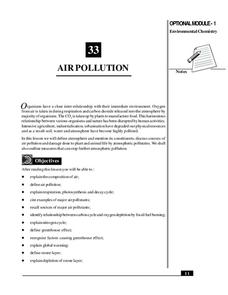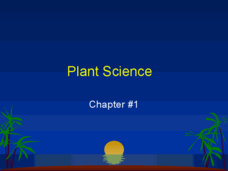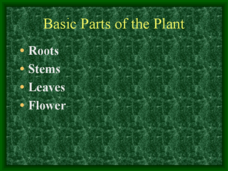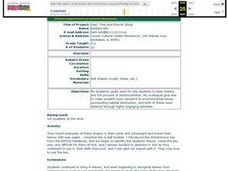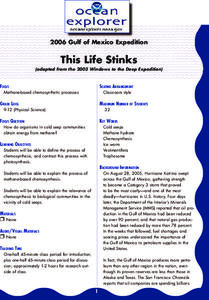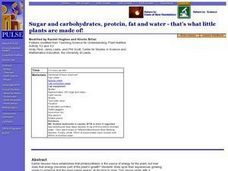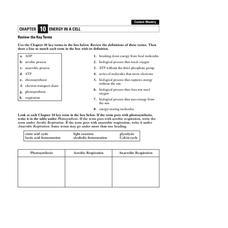Curated OER
Leaves: All-Natural Solar Collectors
Take a good look at tree leaves and notice the adaptations for collecting solar energy. Pupils trace the margins of five different leaves onto graph paper and count the number of squares covered. They then relate this infomation to the...
Biology Junction
Energy Flow Through an Ecosystem: Food Chains, Food Webs, and Energy Pyramids
When a minnow eats a piece of plastic, that garbage often tracks through multiple animals, causing harm to each as it passes through the food chain. Scholars learn about food chains, food webs, and energy pyramids with a presentation. It...
Curated OER
The Plant Food Factory
Plants need sun and water to survive. Let kids discover these facts by reading a block of informational text and considering a scientific quandary. They read the text, then use the information to complete a two-part question about plant...
NOAA
Deep-Sea Ecosystems – Entering the Twilight Zone
Imagine an ecosystem without any light or oxygen, where living things convert carbon dioxide into food. This ecosystem is thriving and might just be the largest ecosystem on our planet, yet we know very little about it. The lesson...
Curated OER
Life Cycle of a Plant: How Living Things Grow and Die
An engaging slide show for 2nd graders introduces them to the life cycle of plants. Students match up plant vocabulary words to their correct definition. Pairs of students play a vocabulary game, then students must draw and label leaves,...
Shelby County Schools
How Ecosystems Work
How does one organism get its energy? What is the main source of energy in an ecosystem? How does the flow of energy affect different types of ecosystems? Answer these questions with a fill-in-the-blank worksheet.
National Institute of Open Schooling
Air Pollution
Seventy percent of the air pollution in China is due to car exhaust. Under the umbrella of environmental chemistry, learners extensively explore air pollution. From the makeup of our atmosphere to sources of major air pollutants, classes...
Chicago Botanic Garden
The Carbon Cycle
There is 30 percent more carbon in the atmosphere today than there was 150 years ago. The first lesson in the four-part series teaches classes about the carbon cycle. Over two to three days, classes make a model of the cycle,...
American Chemical Society
Isolation of Phytochrome
Why do soybean plants that are planted weeks apart in the spring mature simultaneously in the fall? Four independent activities cover the history of phytochrome research, scientist collaboration, the electromagnetic spectrum, and...
Curated OER
Plant Science Chapter #1
It may not stand as a cohesive presentation, but individually you may find a use for these slides. One slide describes how civilization began once man learned to plant and harvest food. Another explores the population growth over time....
Curated OER
Who Wants to be a Millionaire? Human Body Systems and Plants
Fifteen multiple choice questions review a variety of biology topics. In game-show fashion, viewers answer questions about a plant's needs, the skeletal system, and the cardiovascular system. If you happen to teach these three topics...
Curated OER
Basic Parts of the Plant
Beginning botanists learn basic plant structure by viewing this presentation. It is somewhat lifeless because there are no photos, so you will want to display actual plants as you work through the slides. The information, however, is...
Curated OER
Leaf, Tree and Prairie Study
Learners are introduced to the topic of Botany and the process of photosynthesis. Using various habitats, they research the amount of destruction it is facing and how to solve the problem. They make a leaf booklet with leaves they find...
Curated OER
Life is Weird
Separate your science class into small groups and assign each a specific deep-sea organism to research. The class will learn about all of the organisms as each group presents their assigned animal. Following their presentations, you can...
Curated OER
This Life Stinks
Chemosynthetic communities of cold seep areas are considered in this lesson. Working in collaborative groups, marine biology or oceanography learners research and prepare a report about oxidation-reduction reactions involved with...
Curated OER
Sugar and carbohydrates, protein, fat and water - that's what little plants are made of!
Students identify photosynthesis as the mechanism by which plants convert sunlight energy into a usable energy source for plant processes. They identify photosynthesis as the mechanism by which plants create a molecule that can be used...
Curated OER
Energy in a Cell
In this cell energy instructional activity, students will match 8 terms with their definitions relating to the biological processes that create energy in a cell. Then students will match 6 terms as being a part of photosynthesis, aerobic...
Curated OER
Energy in a Cell
In this cell energy instructional activity, students will describe the steps of photosynthesis. Then students will use a photosynthesis energy map and an aerobic respiration energy map to complete 2 short answer questions.
Curated OER
Leaf Straw
Learners investigate plant structure and the process of photosynthesis. Using everyday items, they demonstrate that the leaves and stems of plants can act like a straw. In addition, they identify plant structure.
Curated OER
Plant Life
In this plant worksheet, students will review plant classification by comparing plant characteristics. Students will determine what is needed for photosynthesis to occur. Students will also explore plant transpiration and the...
Curated OER
Limiting Reactant
Chemistry classes learn the importance of a limiting reactant by first considering a cake recipe. Given the recipe and the total amount available for each ingredient, they must calculate how many cakes can be made. Finally, they apply...
Curated OER
Testing Leaves for Starch: the Technique
Like good scientists, kids often want to see first-hand why things are as they are; they can do just that in the starch-testing photosynthesis activity found here. Depending on the age of your pupils, you may wish to do the investigation...
Biology Junction
Chemiosmosis - The Mechanism of ATP Synthesis in Chloroplasts
In this biology worksheet, scholars color and label the chemiosmosis process and complete four short answer questions on ATP synthesis.
Curated OER
Beat a Leaf
A simple, yet effective classroom activity is described in this resource on leaves and how they grow. The activity should lead pupils to discover how plants make their own food and what they need to survive. In the activity, they create...








